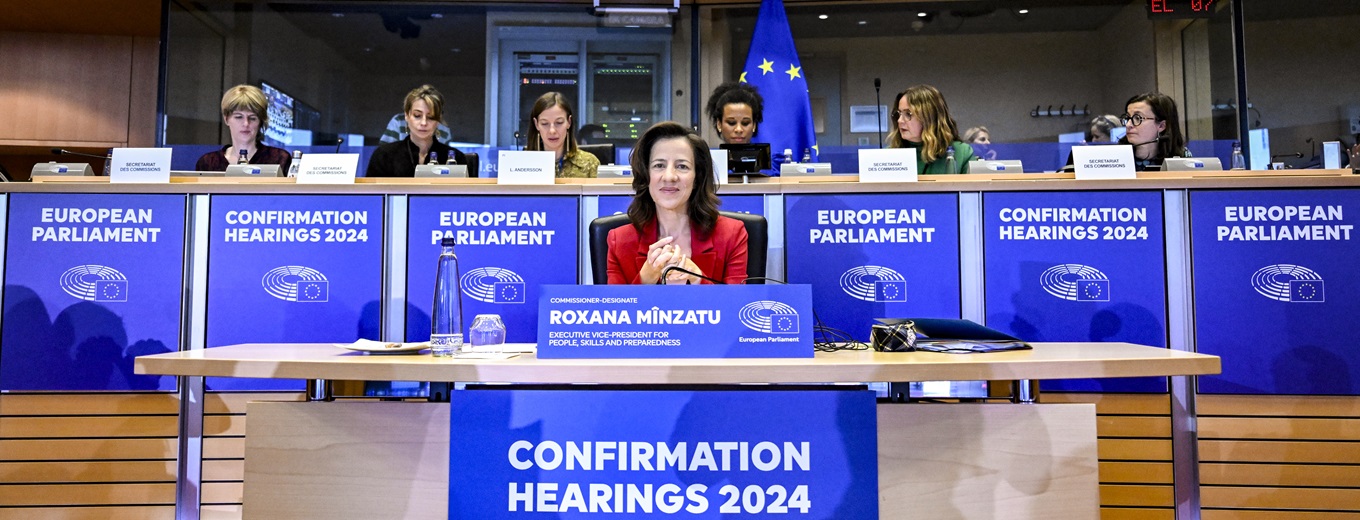The European Parliament held hearings with the candidate Commissioners and approved the new Commission. The Parliament’s draft report for FP10 brings fresh ideas.
After two long November weeks of hearings in the European Parliament, the new European Commission under President Ursula von der Leyen is confirmed. On 27 November 2024, the European Parliament plenary approved the new College of Commissioners with a simple majority. Compared to previous approvals of a new Commission with about two-thirds of votes in favour, this time, the number of positive votes reached a low share of 370 out of 688 votes cast (54%). There was a sizable share of votes against the new Commission from all parties, except for the liberal Renew. The Greens and the right-wing ECR (which includes Meloni’s Fratelli d’Italia) were split in the middle; even the EPP and the Social Democrats S&D, who provide the vast majority of Commissioners, had no unanimity. Nevertheless, a simple majority suffices, and the new Commission will officially take up its work and start the new mandate on 1 December 2024. Unusually, all candidates for Commissioner were confirmed and no one was rejected or replaced. In the past, some candidates stumbled over unprepared hearings or political scandals. This time the political parties made a deal with each other to confirm all candidates under the condition that they in turn support theirs – other considerations mattered little.
In the new structure of the Commission, as proposed by President von der Leyen (see SwissCore article), the responsibilities for the files related to education, research and innovation are divided between several Commissioners. The most relevant Commissioners, nevertheless, remain Ekaterina Zaharieva (Bulgaria/EPP) as Commissioner for Startups, Research and Innovation and Roxana Mînzatu (Romania/S&D) as Executive Vice-President for People, Skills and Preparedness (which includes education). Their performances in the hearings were broadly positively received. Ms Zaharieva used the opportunity of the hearing to confirm that she will fight for a strong standalone FP10, however, one that is more focused and follows fewer priorities. She also confirmed plans for a European Innovation Act and a European Research Area Act. When she spoke about the target of having at least 3% of GDP invested in R&D, she asked for more commitment from the Member States and even suggested increasing the target, potentially up to 4% of GDP. Finally, Ms Zaharieva lamented that SMEs and start-ups in Europe do not benefit enough from Horizon Europe at the moment. On the topic of education, Ms Mînzatu used the hearing to present her priorities for Erasmus. She wants to strengthen the programme, particularly by boosting the VET sector, increasing inclusion efforts (25% of all Erasmus participants should be from vulnerable backgrounds), and putting forward the idea of European School Alliances (inspired by the European University Initiative). Remarkably, both new Commissioners also mentioned the European University Alliances in their hearings and the need to strengthen them as they are considered strategic tools for the implementation of the European Research and Education Areas.
On the same day, the European Parliament approved the EU budget for 2025. The draft budget had included a proposed cut to the Horizon Europe (€-400 million) and the Erasmus+ (€-295 million) programmes. However, the European Parliament had rejected those cuts and defended the programme funding levels in the negotiations with the Member States. The adopted budget now amounts to €12,7 billion for Horizon Europe and €3,9 billion for Erasmus+ in commitments for 2025, roughly in line with 2024.
Finally, the European Parliament’s ITRE Committee also published their draft report on the evaluation of Horizon Europe and its recommendations for FP10, written by MEP Christian Ehler (Germany/EPP). In line with recent reports by Mario Draghi and the High-Level Expert Group (Heitor-group), the ITRE report makes the case for a standalone and agile FP10, guided by experts in the form of two new Councils (one on European Technology and Industrial Competitiveness and one on European Societal Challenges). More controversially, the report suggests that the ERC and the EIC should receive half of the FP10 budget, which amounts to €110 billion. It also wants to develop the European University Alliances into European scientific institutes. Finally, the Heitor group’s idea to create a new ‘Choose Europe’ action to attract researchers to the EU is endorsed by the ITRE report as well. As we are now waiting for the final evaluation of Horizon Europe to be published early 2025, all other pieces for the debate and negotiations of FP10 are ready – the scene is set.

